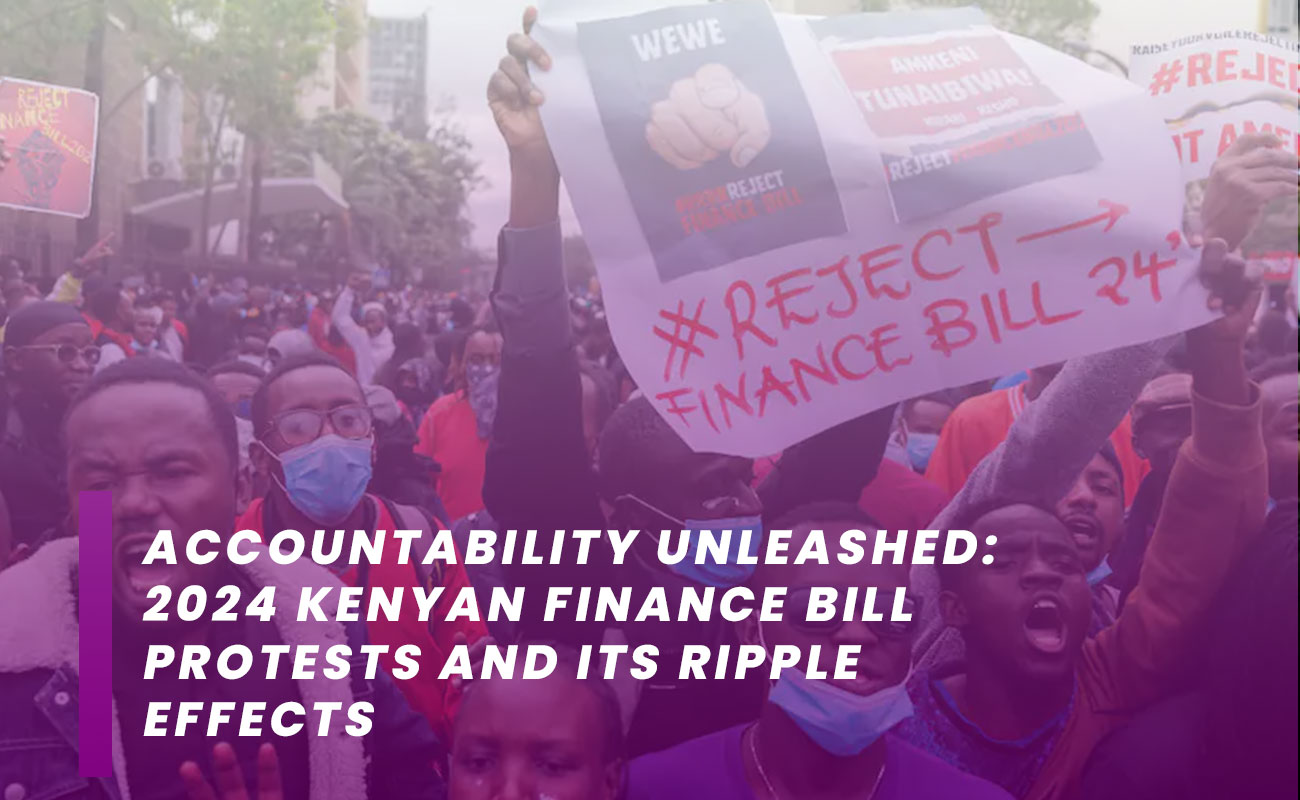
By Francis Assam
Kenya, East Africa’s third most populous country, has a long history of citizens expressing grievances towards the government through protests. While many of these protests have been spurred by electoral dissatisfaction, the 2024 Kenyan Finance Bill protests stood out as particularly unique. This uniqueness stemmed from the youth demographic that propelled the protests and the various channels they used. Not only did they express their displeasure against the proposed bill at its initial stage, but they also rallied themselves to engage in protests that captured global attention.
This decentralized mass protest, widely known as #RejectFinanceBill or the Gen Z Protest, emerged in response to the tax increases proposed by the Kenyan government. This in turn didn’t sit well with young Kenyans who initially mobilized themselves on social media platforms such as X, Tik Tok and Instagram to speak against the bill, with young activists calling for a nationwide action. The protests began peacefully, but soon escalated into riots, leading to clashes with security forces and demands for President Willam Ruto’s resignation.
About the finance Bill
The Kenya Finance Bill 2024 was a legislative proposal aimed at reforming the country’s tax system, primarily through various tax increases. The bill aimed to raise taxes on essential commodities ranging from sugar, vegetable oil, fuel, internet data, diapers, foreign exchange transaction, motor vehicle ownership and more. Its key objective was to bolster revenue generation through tax income, which was projected to be approximately $2.7 billion, thereby reducing borrowing and supporting infrastructure projects.
Additionally, the proposed bill aimed to implement economic reforms to stimulate growth and attract investment, manage public debt which stood at 63% to GDP ratio and improve tax compliance and administrative efficiency. By aligning with international standards and agreements, the bill sought to address the country’s fiscal needs while ensuring financial stability.
Reasons for youth discontent
The finance bill was met with public outcry as it didn’t resonate with the economic clime in Kenya, with many youth and other demographic groups expressing their displeasure.
According to International Politics and Society, 7.8 million out of a population of 56 million Kenya’s population live in extreme poverty, with most of them in rural areas where the situation is dire.
Also, the impact is particularly severe among the youth, who represent around 80% of Kenya’s population. Despite an overall unemployment rate of 12.7%, youth employment stands at a staggering 67%.
Furthermore, the finance bill was engineered with the backing of the International Monetary Fund (IMF), whose neoliberal economic policies have plunged several African countries into poverty. In Kenya’s case, the finance bill only primarily benefits Western interests and the country’s elite, while leaving a large portion of the ordinary population grappling with poverty and unemployment.
The government’s disconnection from the harsh reality that the ordinary Kenyan people faced is illustrated by President Ruto’s unprecedented expansion of his executive branch, adding 50 new chief administrative secretary positions and creating an office for the prime cabinet secretary, despite Kenya already having ministers and cabinet secretaries-an action that runs contrary to the government’s claim of reducing cost and generating revenue.
These factors drove youth agitation through social media platforms such as X, TikTok, and Instagram, where they voiced their opposition to the bill and protested for its immediate abolition. They were aware that the Finance Bill posed a significant threat, with its proposed tax increase likely to push a large segment of the population deeper into poverty, worsening the already critical economic challenges facing the country.
The Protest
June 18, 2024 witnessed the beginning of the Kenyan Finance bill protest which was marked by widespread demonstrations across the country. The protest at its initial stage was peaceful, but later escalated into violent clashes with security forces.
Amnesty International reported that at least 50 protesters were confirmed dead, with casualties estimated to reach 200. Additionally, over 413 people were severely injured, and numerous youths detained. Disturbingly, footage emerged showing police firing live rounds at demonstrators who wanted to enter the parliament.
The violence sparked widespread condemnation and calls for accountability, as Kenya grappled with tragic consequences of the protests. The protesters, using various platforms including social media, demanded President William Ruto’s resignation.
Hard Accountability
The uproar from the protests prompted significant changes and served as a wake-up call for the Kenyan government.
President Ruto’s first action amid the reoccurring protest was to announce the withdrawal and rejection of the finance Bill 2024 during a televised address. He acknowledged the people’s strong opposition and stated that he would not sign the bill into law.
He further proposed a multi-sectoral, multi-stakeholder’ engagement. This dialogue aimed to address the content of the bill, and auxiliary issues related to austerity measures and the fight against corruption.
Ruto directed that further austerity measures be implemented to reduce expenditure. These measures began with the Executive of the president and extended to the entire executive. Operational expenses were to be reduced, including allocations for confidential votes, travel budget, hospitality, vehicle purchase and renovation.
In conclusion, the 2024 finance bill protests in Kenya have captured global attention, highlighting issues that resonate beyond Kenya’s borders and across Africa. The unrest has sparked similar protests in Nigeria and Uganda, reflecting a broader dissatisfaction with poor governance. Across the continent, leaders are often criticized for their lavish lifestyles, costly government operations, and policies that adversely affect ordinary citizens. Given these tensions, it seems increasingly likely that we might witness another wave of revolutionary movements akin to the Arab Spring in Africa. The Finance Bill protests may well be just the beginning of a larger push for governmental accountability and reform.
